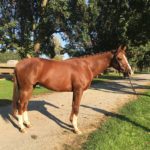http://www.youtube.com/watch?v=-jcq-NTT7Qs&feature=plcp June 29, 2012–After laying out the two horsekeeping options most of us face ? boarding barn or horsekeeping at home ? I’d like to zero in now on some of the finer points of these options. if you choose a boarding barn, you’re choosing a community. And, like communities, each has its own personality, strengths and weaknesses. What do you want to get out of the place you board? I know when I chose the place where I keep my horses, I wanted this sense of community ? people like me who went there at different times of the day to be with their horses, whether they are “riders,” “groomers,” “cleaners” or “socializers,” as one new friend explained the population segments of the barn I chose during the early weeks I was there. I love the idea of having different people around all the time, but not necessarily being tied to certain times of day or days of week ? or feeling obligated to converse or ride with ?them. Of course, that stuff all happens spontaneously, but not having to plan or coordinate it is nice. So in this community we choose for ourselves and our horses, there are certain traits I’ve noticed (and gleaned from conversations with fellow boarders and our barn manager) that make this experience the best it can be for everyone. As I considered what makes these barn communities strong and fulfilling ? and encourages the best kinds of friendships that tend to form around horses, ?I listed a few of them here. Now it’s your turn to chime in with other things that are important to ?you in your barn community. 1. Be a good neighbor.?It should go without saying (but a gentle reminder never hurts) that you need to clean up after your horse (why do they always poop in the high traffic areas?), don’t leave your grooming stuff and tack laying around, and be mindful that any others (such as farriers) who come to the barn on your behalf clean up their messes, too. If someone needs help, and you can lend a hand, you’ll appreciate that same hand being extended to you when the tables turn and you’re the one in need. 2. Be a good friend. Even to the people you don’t know very well. You may not agree with or understand what in the heck they’re doing with their horse, but we’re all on our own journey, and it’s important to respect that. And, unless harm is being done or someone’s in real danger, it’s a good idea to watch, listen, learn, and support one another as much as possible. Or just be quiet. 3. To thine own self be true. In a barn, like any community, you’ll find no shortage of opinions. Some people are more vocal about these?than others . I’ve learned to listen, nod, comment (or question if I’m curious), and then run it all through my own filters and use what’s truly helpful and discard the rest without apology. In the end, you always need to listen to your gut and do what you feel is right and best for you and for your horse. 4. Go to the source. If there’s a problem of any kind, do your level best to talk with the person who caused or can fix it. Backbiting in any barn community should be left to the flying insects. Nothing is more damaging to these relationships than barn gossip or griping about the actions of others. As tempting as it may be, don’t do it. And if you can, don’t even listen to it. Or as one friend says, “just say ‘whoa’ ? and get really busy with your horse.” 5. The eyes have it. One of the coolest things about a barn community is that even though you can’t be there all the time, other people are coming and going at all times of the day. It’s an invaluable good habit to keep an eye on others’ horses when you’re there and to speak up if something doesn’t seem right with one of them. As my father is fond of saying, “horses can hurt themselves on a Kleenex.” By simply paying?attention to the horses you see when you are there, you could help minimize a bad situation like illness or injury by catching it early. 6. Pool your resources. That is, put the important names and numbers of your horse friends, vets, farriers, equine care providers of all kinds, feed, hay, tack, and other favorite resources in one place, and keep adding to this list as you discover or hear of new ones. One of the neatest things about a barn community is sharing resources like these (as well as recipes and travel itineraries and show/clinic schedules and transportation). Being mindful about gathering/keeping this information at your fingertips (or, better, in your phone) means you’ll always have it when and where you need it! So . . .what else? What tips, advice, or words of wisdom do you have for those looking for a great boarding community? What questions should you ask when considering a facility ? or choosing one over another? What do ?you love about your barn community? What are some red flags that tell you it’s one to avoid ? or time for a change? I look forward to another lively discussion!
Barn is Community
What did you think of this article?
Thank you for your feedback!







